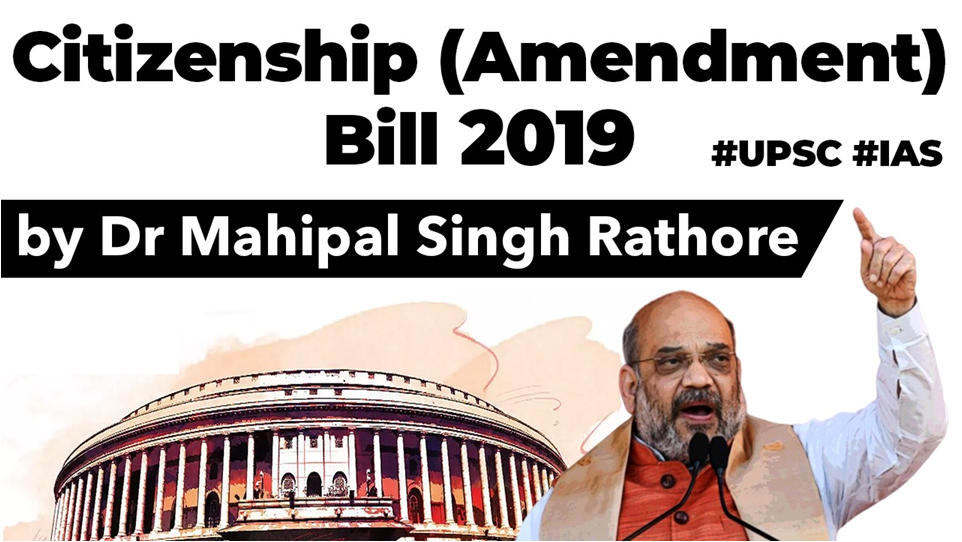Table of Contents
- In Lok Sabha, 311 votes were cast in favour of the Citizenship Amendment Bill and 80 votes

- TheCitizenship Amendment Bill 2019 is a legislation which will amend the Citizenship Act of 1955.
- The Citizenship Amendment Bill 2019 proposes granting Indian citizenship to the persecuted minorities such as Hindus, Jains, Christians, Sikhs, Buddhists and Parsis fleeing Bangladesh, Pakistan and Afghanistan.

- The legislation seeks to make it easier for non-Muslim refugees and illegal immigrants from the three Islamic majority nations , to gain Indian citizenship.
- The legislation is applicable to groups who arrived in India on or before December 31, 2014.
- The Citizenship Act, 1955 regulates who may acquire Indian citizenship and on what grounds.
- A person may become an Indian citizen if they are born in India or have Indian parentage or have resided in the country for a period of time, etc.
- However, illegal migrants are prohibited from acquiring Indian citizenship.
An illegal migrant is a foreigner who:
- (i) enters the country without valid travel documents, like a passport and visa, or
- (ii) enters with valid documents, but stays beyond the permitted time period
- Under The Citizenship Act, 1955, one of the requirements for citizenship by naturalisation is that the applicant must have resided in India during the last 12 months, as well as for 11 of the previous 14 years.
- The amendment relaxes the second requirement from 11 years to 6 years as a specific condition for applicants belonging to these six religions, and the aforementioned three countries.
Consequences of acquiring citizenship:
- The Bill says that on acquiring citizenship:
- such persons shall be deemed to be citizens of India from the date of their entry into India, and
- all legal proceedings against them in respect of their illegal migration or citizenship will be closed.
Exceptions
- After protests from North east, the Bill adds that the provisions on citizenship for illegal migrants will not apply to
- The tribal areas of Assam, Meghalaya, Mizoram, or Tripura, as included in the Sixth Schedule to the Constitution.
- These tribal areas include Karbi Anglong (in Assam), Garo Hills (in Meghalaya), Chakma District (in Mizoram), and Tripura Tribal Areas District.
- It will also not apply to the areas under the Inner Line” under the Bengal Eastern Frontier Regulation, 1873.
- The Inner Line Permit regulates visit of Indians to Arunachal Pradesh, Mizoram, and Nagaland.
- The Sixth Schedule gives tribal communities considerable autonomy; the States of Assam, Tripura, Meghalaya, and Mizoram are autonomous regions under the Sixth Schedule.
- The Sixth Schedule of the Constitution of India allows for the formation of Autonomous District Councils to administer areas which have been given autonomy within their respective states


Issues
- The fundamental criticism of the Bill has been that it specifically targets Muslims.
- Critics argue that it is violative of Article 14 of the Constitution, which guarantees the right to equality.
- The government, however, maintains that the Bill aims to grant citizenship to minorities who have faced religious persecution in Muslim-majority foreign countries
- The north-eastern states are against the Bill as they believe it will lead to a greater influx of illegal migrants.
- In the North-eastern states, the prospect of citizenship for massive numbers of illegal Bangladeshi migrants has triggered deep anxieties, including fears of demographic change, loss of livelihood opportunities, and erosion of the indigenous culture.

Prosecution of Non – Muslims in Neighbours
- Ahmadiyya and Shia Muslims in Pakistan
- The murder of atheists in Bangladesh
- Tamils in Sri Lanka
- Madhesis in Nepal
- Buddhists from Tibet
- Rohingyas in Myanmar
Latest Burning Issues | Free PDF






















 WhatsApp
WhatsApp